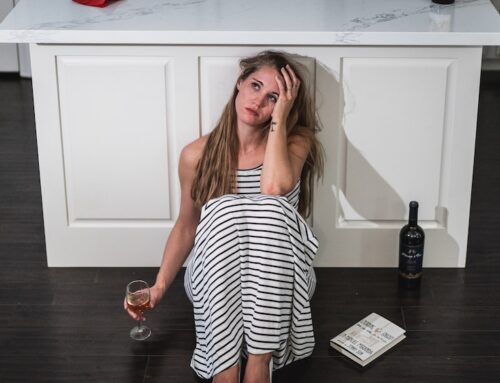Traveling While Sober: Will I Still Have Fun?…from The Fix…

Getting sober isn’t an event, it’s for the long haul, so I have to be able to do the things I love. Photo by Artem Beliaikin on Unsplash
We arrived breathlessly at the Vedado home, a stately stone structure with a newly refurbished interior, ready to learn the secrets of Cuban cuisine. My new husband and I were famished in the way that happens when you travel, lost in time and space, not realizing we were hungry until the situation felt dire. We pulled up to the table, lovingly set with custom flatware and bejeweled napkin rings, ready to chop and dice our way into full. But first, Mojito time!
I should’ve known.
Alcohol as Social Lubricant
From my very first international trip—a self-funded excursion to France at 15—drinking had always been a big part of traveling. At bars it was easier to meet people, I often said. Was it really a big deal if that occasionally involved throwing up on them?
I continued to believe that alcohol was critical to my so-called social life, even if, toward the end of my addiction, said life mostly involved knowing where Columbus’ most private bathroom stalls were located. Yet, I worried. Besides travel, I couldn’t imagine how I’d date/make friends/comport myself at fundraisers if I wasn’t able to drink, completely overlooking how the trajectory I was on did not include indoor plumbing.
When at last I did quit drinking and using, and the time to travel actually came, I wasn’t so worried. By then, I had the shelter of a husband who liked to drink. One look at us and it was clear somebody needed to stay sober. I didn’t realize the pressure this relieved.
Until our marriage ended.
Escape to Borneo
That first summer as a divorcee, I was desperate to escape my life, at least for the duration allowed by my accrued vacation time. I wasn’t a fan of group travel, but then I found something called, “The Extreme Headhunters Tour.” Those days I wanted nothing more than to see some heads roll, and though I knew I wasn’t going to get to do any actual beheading myself, the idea that I would learn about others who had was intriguing. Better still, the excursion was billed as physically challenging, while also offering the rare opportunity to sleep overnight at a headhunters’ longhouse. I would meet real Borneans, and other travelers (i.e., men) with the physical stamina and means to book such a tour.
I signed on, only to realize the group was largely comprised of retired female librarians. That was the least of my concerns, however, once happy hour hit.
Our night with the headhunters consisted of playing a little game. I’m sure there was some food, but what I remember was the drinking. The evening’s entertainment was built entirely around tuak, a kind of coconut liqueur that’s popular in Borneo. The game went something like this: buy one for you, then buy one for me. The crowd was visibly disappointed that I didn’t drink, especially since the librarians were in bed. It was so uncomfortable—and then there was the whole divorce situation—that I briefly considered putting us all out of our misery and throwing back some tuak, but I was lucid enough to know I might not make it out of Borneo if I did.
“You’re on Vacation, Live a Little!”
Having traveled the world sober and not sober, I’ve learned that I take my addiction with me everywhere, whether I’m indulging it or not. So it would be an outright lie to claim that those Mojitos in Cuba held zero interest. The glasses had been chilled, crushed ice and fresh mint were on hand, and some beautiful amber liquid awaited my pour. Worse yet, the alternatives were Fresca sweetened with extra sugar and lime juice, or tap water. In my daily life, I pass on sugary drinks like soda. Begrudgingly, I took the water.
I refuse to let fear keep me from traveling. Getting sober isn’t an event, it’s for the long haul, so I have to be able to do the things I love, such as meeting people whose lives are nothing like mine and coming together with them in an everyday way, like over a meal. The good news is: with some preparation, it’s increasingly possible to avoid these triggering episodes altogether.
In the case of Cuba, I should’ve realized that cocktail mixing was part of the itinerary when I booked it. The activity was on the booking page, but at the bottom of the list. I have traveled enough to know how squeamish others can turn when faced with nondrinkers like myself. Over the years I’ve heard all the objections: “You’re on vacation, live a little!” Or the ever-popular, “Everyone must try this.” And my personal favorite, “Who will know?” Out of context they’re laughable, but I know how my brain can work. Or not work. Anyway, why test this the hard way?
Managing My Ego
For our first anniversary trip, I didn’t want to constantly deal with these objections so when I booked rooms or tours, I notified hosts that my husband and I didn’t drink. This was surprisingly difficult for me: My ego wasn’t so thrilled about drawing attention to the fact that there’s something I can’t handle. After a couple of decades without a drink, the terminally unique creature in me apparently decided that it wants to be just like everyone else. Fortunately, my centered self at home could spot and manage these mental objections. By the time I hit the streets of Paris, I was ready to ward off potential threats to my sobriety.
“A cup of glass!” I blurted out in my best high school French. The server looked at me curiously. Just as I suspected, I thought, coolly repeating the phrase. She can’t even understand what it means to drink water with a meal instead of wine!
I’d like to say I laughed and corrected myself, but that would be a lie. I was tweaked to the point of leaving the restaurant, only realizing my error when I reached the street. From then on, I fixed my phrasing to ask for sparkling water.
Not ordering alcohol had no effect on the way I was treated. The servers did not care whether I drank or not, which is very different from the reception I receive in the U.S. Here, where tipping is a significant portion of pay, the check total matters. There, where tips are more nominal, they could care less.
The “worst” experience with alcohol was in another cooking class. The host, despite knowing ahead of time that we didn’t drink, had only tap water on the table. But I put that word in quotation marks because everything else was absolutely delightful. Our host turned out to be a TV personality who was having boyfriend issues. I was happily riveted to my chair for hours.
In Lisbon, I expected something less cosmopolitan and thought there would be less knowledge or acceptance of sober travelers. Yet there was a similar nonchalance from servers, tour guides, and everyone else we met. Best of all was the cooking class, where four of eight of us were non-drinkers. I took one look at the sober hipster newlyweds and said conspiratorially, “I assume you’re doing it one day at a time?” To which the wife replied, “What are you talking about?”
The Freedom to Go Anywhere…Sober
Just as in everyday life, the biggest battle with alcohol while traveling is internal. It helped enormously to pave the way ahead, letting guides and hosts know I wouldn’t be drinking. But the most valuable part of this practice was that it forced me to acknowledge my own roadblocks so that when my ego cropped up mid-travels, I didn’t have to believe what it was telling me. Unlike my experiences in Borneo and Cuba, I never felt trapped, which is a trigger.
Knowing what steps to take ahead of time, I can go anywhere.

